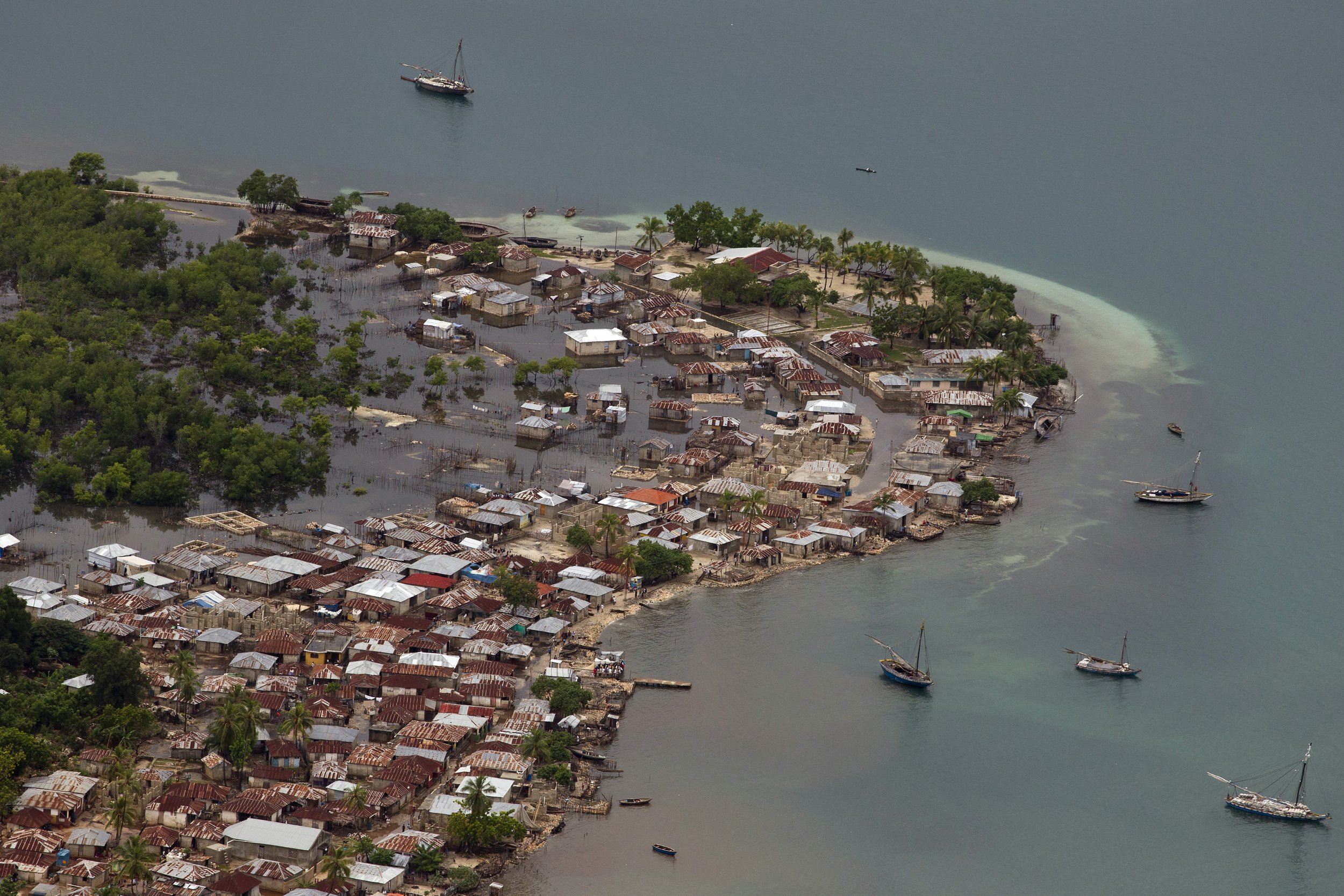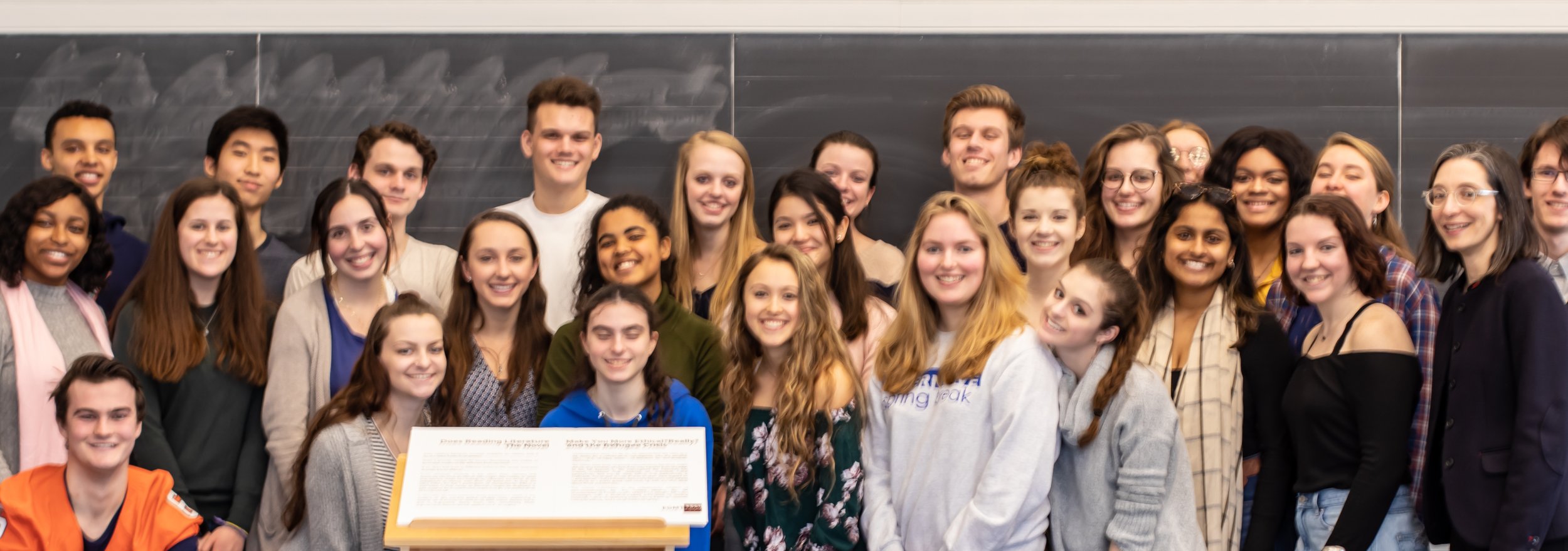
how it works
UN Photo/Logan Abassi: Hurricane Sandy’s heavy rains and high seas flood a village in Haiti (2012).
connect
We participate in public advocacy events where we introduce our research questions to broad audiences and aim to increase curiosity on how to bring together the humanities and humanitarian policy. We also teach university classes and offer educational resources to help find innovative ways to compassionately engage students in humanitarian issues.
research
We team up with scholars from various disciplines to conduct research on the potential of fiction to influence policy and promote prosocial behavior. We also form relationships with and highlight the work of scholars exploring these questions across disciplines: social psychology, environmental humanities, literary and cultural studies, public policy and more.
read
We host bookclubs where we we are joined by humanitarian policy experts, authors, and literature experts to help us connect the novels themes to present day crises. Bookclubs have included both public online platforms with over 1000 readers from all over the world to small bookclub events focusing on aid practitioners. We use these clubs for advocacy, engagement, and research.
act
We engage with organizations, activists, authors, scholars, and public events to find and promote actions and organizations that are addressing the needs of millions of people caught in crises and calling for policy change. We discuss how fictional stories imagine emerging future crises and how they can help us understand what new actions will be needed for effective advocacy and policy.

public advocacy
We participate in public events that can help us engage audiences and form partnerships and communities curious about bringing together the humanities and humanitarian policy.
Some of our public engagements have included:
Devex World on the main stage discussing ‘Changing the Narrative’ on humanitarian crisis.
The Hilton Humanitarian Symposium and Prize Ceremony themed “Roots of Resilience,” where we presented on a main stage event on ‘Cultivating Action: The Power of Narrative’ introduced by journalist Soledad O’Brien and moderated by Raj Kumar, Devex.
The United Nation Centre for Humanitarian Data ‘Humanitarian Data Forum,’ where we presented in a workshop on storytelling.
The International Humanitarian Studies Association (IHSA) Conference in Dhaka, Bangladesh where we presented on a panel on ‘Exploring the Humanities in Humanitarian Pedagogy: Read for Action’.
The Environmental Institute Environmental Futures Forum.
Research presentation at the American Comparative Literature Association.
Featured on podcast Post45 episode on ‘Contemporary Literature from the Classroom’.
Independent bookstore event with New York Times bestselling writer and emerging authors on Building Empathy through Fiction.

read for action: for educators
Read for Action (RFA) is designed for easy incorporation into undergraduate or graduate courses, seminars, and student and faculty reading groups.
You read the books with your class or group. The materials on our Read for Action website connect you to discussions, questions, and ideas from our authors, researchers, policymakers and other readers your group can engage with. We have recorded conversations, webinars, and an online discussion platform you can pull from. Our resources on this website offer educators maximum flexibility to incorporate Read for Action into their courses at any time, and with as many or as few of the resources as makes sense for your course subject and level. Check out the available resources on the pages for The Displacements, Exit West, How Beautiful We Were, and A Passage North.
The novels are chosen with a broad audience in mind and faculty across the fields of public policy, politics, environmental humanities, languages and literature and more have participated. We choose contemporary global fiction, widely available internationally in new and used editions, at libraries, and in audiobook formats.
Students in Professor Adrienne Ghaly’s course on novels and humanitarian action, University of Virginia, Spring 2019.
“I think that [reading fiction] actually dignifies people more than just seeing them as a victim of a situation because you're also seeing who are they outside the conflict, and what decisions did they make along the way. That just makes you relate to them more.”
“When I read an article about something like a climate disaster happening to a person, my emotions just kind of get in the way… In a book, I do think more of the kind of the structures in place that allowed something to happen.
—Students in Professor Adrienne Ghaly’s course at the University of Virginia on novels and humanitarian action, Summer 2024.
“Our discussion of The Displacements [with students completing the Global Certificate] was simply fabulous. I had two students in the group who were directly affected by hurricanes. One young woman fled New Orleans as a child during Katrina, and her family permanently relocated to Houston. And, you probably know where this is going – they were then affected by Harvey, too. Another young woman is from Orlando and lives in a neighborhood affected by the storms last fall. I then read The Displacements with our local NPR station’s Likely Stories Book Club.”
https://www.kwbu.org/likely-stories-book-club
—Dr. Rebecca McCumbers Flavin, Baylor University, Department of Political Science; Advisor, Baylor Model United Nations
"Reading really good novels that were written lately, about issues that really matter today—like climate change, war, the migrant crisis etc.—that is new for me. And it’s also new for me to talk about these kinds of issues with other students, which has been wonderful, honestly. It makes me feel better to talk about these things and to know that I’m not the only one who’s thinking about them. I would like to do more!"
"This has been such a hard year, with everything that’s going on in the world, especially with Gaza. And it’s been hard here on campus, because so many of us have personal connections to the region. And we’re connected to it on both sides of the conflict, so we all feel sad and upset, but we sometimes feel angry, too. And we know we shouldn’t be angry at each other, because none of this suffering is our fault, and we all want it to end in some way. But it’s hard. So talking about these things as they come up in books, I’ve been surprised by how much it has helped me, personally. I wouldn’t have picked up any of these books on my own, and I definitely wouldn’t have talked about them with people outside my community. But it’s felt like I can connect to the characters in these novels, and I can think about the ways the novels work to establish those connections. And it has been so meaningful to me to talk about those things with other students who come from different communities in Queens, some of which I don’t know too much about."
- Students in Gloria Fisk's class on global literature at Queens College, CUNY, Fall 2023.
find the books
We believe local bookstores are essential community hubs that foster culture, curiosity, and a love of reading, and we're committed to helping them thrive.
Borrow physical books, ebooks, and audiobooks for free from your local public library! Libby is a global reading app where you can check-out books right from home.















